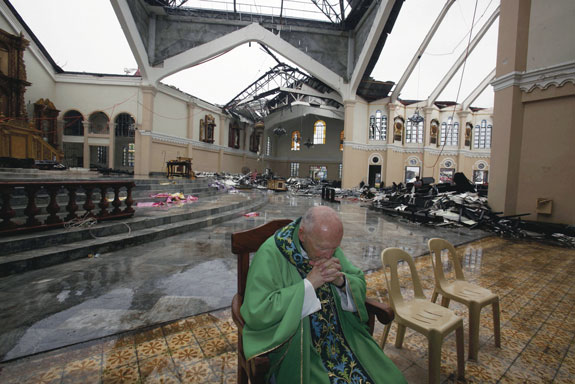
WASHINGTON (CNS) – The “widespread loss of life and property” in the Philippines caused by Super Typhoon Haiyan (Yolanda) warrants granting temporary protected status to Philippine citizens residing in the U.S., a U.S. bishop told federal officials in a Nov. 18 letter.
The status, known as TPS, allows citizens of the designated country to reside legally in the U.S. with work authorization.
The U.S. government grants it after determining that armed conflict, political unrest, environmental disaster or other extraordinary and temporary conditions exist in a nation and that the return of that country’s nationals would further destabilize the nation and potentially bring harm to those who return.
In the case of people from the Philippines, TPS “would protect them from deportation to a nation that, for the time being, is unable to assist them in their reintegration,” said Seattle Auxiliary Bishop Eusebio Elizondo, chairman of the bishops’ Committee on Migration.
“[It] would ensure that nationals of the country currently residing in the United States are able to work and to send remittances back to their families, thus helping aid the recovery,” he wrote in a letter addressed to Rand Beers, acting secretary of the U.S. Department of Homeland Security (DHS).
Copies of the letter were sent to Secretary of State John Kerry and Denis McDonough, White House chief of staff.
Haiyan cut a path of devastation across the central Philippines Nov. 8. Vietnam also was hit by the typhoon.
The official Philippine death toll from National Disaster Risk Reduction Management Committee stands at 3,976, as of Nov. 19. The number of displaced persons is now more than four million, and the total number of people affected is 10.4 million. According to the committee, which reports on actual numbers rather than estimates, there are more than 74,000 families occupying 1,151 evacuation centers. Another 1,602 individuals have been recorded as missing.
“Given the widespread loss of life and property caused by Typhoon Haiyan, in our view the Philippines warrants an immediate grant of TPS,” wrote Bishop Elizondo. “Although DHS can take other limited actions to assist this population, they are insufficient compared to the magnitude of this disaster.”
As of Nov. 18, Baltimore-based Catholic Relief Services (CRS) had started distributions of aid to storm victims in the Philippines.
“We are prioritizing shelter. These people need a roof over their heads. They have been out in the open for too long,” said Sean Callahan, the agency’s chief operating officer. “This will be the first stage of a long road that will first bring emergency relief, then ultimately recovery and reconstruction to tens of thousands of families in Leyte and Samar.
“We are planning this to include housing, water, sanitation and helping families rebuild their livelihoods,” he said in a dispatch from the Philippines, where he was visiting some of the devastated areas with U.S. Cardinal Theodore E. McCarrick, retired archbishop of Washington, D.C.
The cardinal, who was in Manila, Ormoc and Palo Nov. 18, is a board member of CRS, the U.S. bishops’ overseas relief and development agency.
“The devastation we have witnessed here has been catastrophic. This is a time for all nations to stand with our Filipino brothers and sisters,” he said in a statement. “We are drawing on a long relationship between the church in the U.S. and in the Philippines. This is a strong and proud people who have a taken a hard blow, but our prayers, together with the support and generosity of the global community, will rebuild their lives and communities.”
CRS has already committed $20 million in emergency aid, with the funds expected to come from a second collection the agency asked U.S. bishops to take in their dioceses before the end of the year.
In a Nov. 12 letter to Archbishop Jose S. Palma of Cebu, president of the bishops’ conference of the Philippines, New York Cardinal Timothy M. Dolan said: “Together with the Catholic faithful throughout this country, we assure you of our prayers for the victims of this disaster and for the survivors as they struggle to rebuild their lives.”
Cardinal Dolan sent the letter during the U.S. bishops’ annual fall general assembly. The New York prelate completed his three-year term as president of the bishops’ conference at the conclusion of the meeting.
